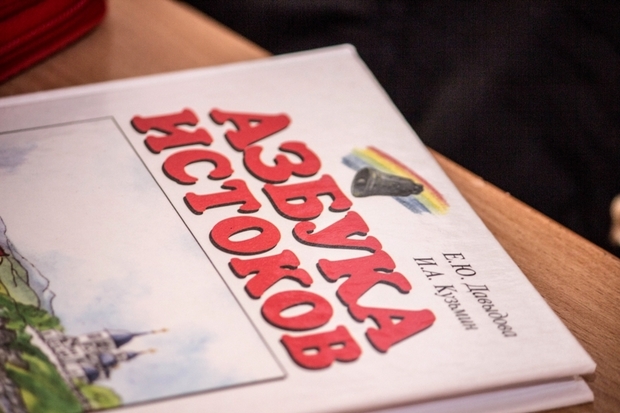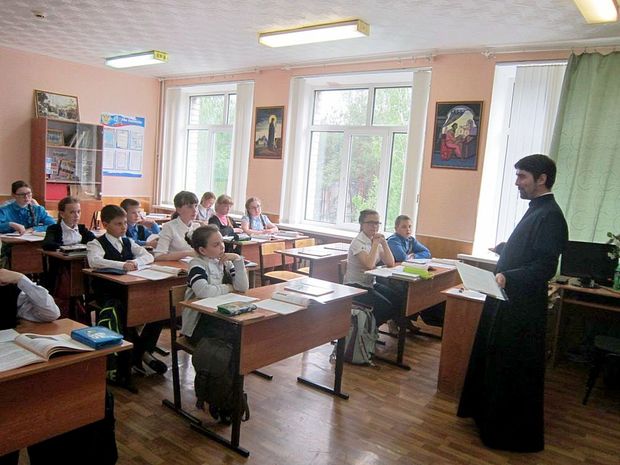Vsevolod Chaplin about Orthodoxy lessons: ''Imposition of ''secularism'' in any form is unacceptable...''
The Orthodox blogger reflects on religious culture in schools, religious codes and cultural genetics
The Russian media is actively discussing the issue of introduction in the curriculum in schools of a new religious subject — Origins. Some have raised the alarm suggesting that it will impose Orthodoxy on the students. This initiative, as expected, has found its supporters and opponents. Orthodox columnist of Realnoe Vremya, Archpriest Vsevolod Chaplin also joined the discussion. In a newspaper column written specially for our online newspaper, the priest explains what forces are fomenting the dispute.
Origins is not an obligatory subject
Each new step that promotes learning of religious cultures in public school causes a well-orchestrated and loud reaction. At the same time, sometimes those people are for preservation of the Soviet standards of attitude to the religion in school who seem to be dislike all Soviet and reverently look at ''enlightened'' West. Sometimes these people even refer to ''the separation of school from Church'', purely Soviet wording absent for more than twenty years in the Constitution and other Russian legal acts.
Now the controversy has broken out in connection with the project of teaching of religious cultures from 1 to 11 grades and the unexpected media attention to the subject Origins, which has already been taught not for the first year in some schools — usually within a subject area with the unpronounceable name ''The bases of spiritually-moral culture of the peoples of Russia'' (ODNKNR). I like the word ''Origins'' much more than the frightening acronym. However, ''Origins'' can also be reduced to DNA because the subject describes and forms the ''spiritual code'', ''cultural genetics''.
Let us see what it is all about. Of course, it is not an obligatory subject. The foundations of specific religious cultures, as well as the subject about different cultures and the course of secular ethics (which, in fact, has been replaced by etiquette), have long been taught in fourth grades. They are optional subjects. When this practice was introduced, we were alarmed by ''a division of the students'', interreligious conflicts and almost a collapse of the state. None of this happened because it could not happen. In Moscow, the Caucasus, the Far East, in Kaliningrad, the students quietly study the foundations of their worldview adopted in the family and never quarreled because of the fact that their worldviews are different.
The course of ''Origins'', as far as I know, is the first of the subjects that may be included in ODNKNR. This subject is secular, although it mentions the temples, icons, and other phenomena of Russian Christian culture. Even Soviet textbooks couldn't avoid such references because without Orthodox framework it is simply impossible to describe the culture of the Russian people and many other peoples of our country. However, once again I will explain: ODNKNR is a subject area. Within its framework there can appear a variety of courses and tutorials, including ones associated with individual nations, regions, religions. I am sure that in our country there are such people who could develop such course. A school can choose any such course which has received the professional rating. Or even several courses, for example, for different groups — for Orthodox Christians and Muslims.

''ODNKNR is an entire subject area. Within its framework there can appear a variety of courses and tutorials, including ones associated with individual nations, regions, religions.'' Photo: cherinfo ru
The conflict of worldviews?
However, the loudest with new philosophical moral subjects in the discussion are not Orthodox or Muslims. It is the supporters of the exaggerated ''secularism'', opponents of the growing influence of religion, and unfortunately, those believers who allow the above mentioned figures to ''fool'' themselves. They are trying to make us believe that the school must remain ''neutral'', however, they forget that secularism itself is not neutral. This is only an option of ideological choice, which for various reasons has monopolized school in the Soviet times. However, they failed to create a ''Soviet person'' without ethnicity and religion. And I am sure, it will impossible to create ''a Russian person'' without it as well. One has a worldview, including a view of society, based on Christianity, someone, on Islam, others, on secular values. Even science is compatible with very different views, as evidenced by debates between scientists. ''Scientific worldview'', alas, is the notion of Soviet ideologues.
There cannot be a ''school'' worldview as well, if only we are not talking about mono-ethnic school and mono-religious (as, for example, Orthodox schools or Jewish schools, which have, among other things, financial support from the state). In all other cases, an institution must recognize and accept within itself the presence of different ideological and religious groups. And the parents of children belonging to each of them have the right for that school education was compatible with upbringing in family.
It is incorrect to force everyone to learn Christian or Islamic culture. But it is also incorrect to teach them an estranged, ''equidistant'' perception of many religions. Usually, for a believer, it is his and only his faith is true, and imposition of ideas that are contrary to this view means to enter the school education in conflict with the worldview of the family. Parents have every right to take their children away from the school that imposes such values and to require establishing an independent philosophical course. Since, according to the International Convention ''On fighting discrimination in education'', the states must ensure that parents or guardians ''a possibility to provide education of their children in conformity with their own religious and moral beliefs''. Exactly therefore the imposition of ''secularism'' in any form is unacceptable. It is not an objective reality and not ''the only correct doctrine''. It is just one of the equal ideologies.

''It is incorrect to force everyone to learn Christian or Islamic culture. But it is also incorrect to teach them an estranged, ''equidistant'' perception of many religions.'' Photo: meleparhia.ru
''There are no one-size-fits-all peoples''
All that I am trying to explain here has long been understood in most multiethnic, multireligious countries in the world. They realized it after much trial and error, and sometimes even after wars, genocides, and revolutions. Almost everywhere, where the population is heterogeneous, students have several religious and ideological options. And everywhere it helped to calm the passions and to resolve conflicts — even in the Balkans, where recently people have been killing each other on an ethnic basis.
There are no one-size-fits-all peoples, religious communities or believers and unbelievers. A wise society understands it and rejects attempts on unification, creating both a common space and subspaces existing for those issues where people can not be together. Because for them there are things more important than social mechanics, peace, comfort and even life on earth. To ignore these things, try to replace them with new ''constructs'' means to cause a severe conflict.
The greater mistake will be to keep ''free site'' in the areas of spirituality and especially ethics in school. The vacuum in these areas is deadly dangerous for the country. Recently I has been told how a four-year-old child growing up in an ordinary family and from childhood accustomed to iPad is capricious in cinemas or zoo but feels great in a big shop. From a very young age he is managed by signals of mass culture and mass media, invented not by us and not here. At some point these pulses can start to decide for us the key issues of the future, including questions of war and peace. It can even give us the command to self-destruct. That is why we need to found spiritual and moral basis of personality and people by ourselves and to do it at schools.